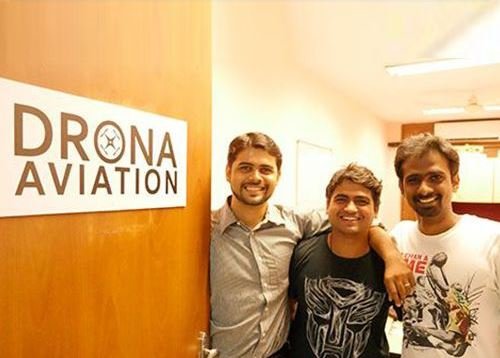Drona Aviation's Indigenous Nano Drones Empower School and College Students with Learning Opportunities

The nano drone market is on the brink of significant growth, with projections estimating it to reach $4.81 billion by 2027. Within this burgeoning industry, the educational drone sector is also poised to expand, expected to be worth $500 million by 2026. Drona Aviation, a pioneering player in this field, not only manufactures nano drones but also provides educational resources to schools and colleges, empowering students to create their own drones through starter kits. Drona Aviation has already made strides by establishing a presence in 8,000 schools across India, and it has ambitious plans to extend its reach to 100,000 schools and 600 colleges within the next 2-3 years.
This surge in interest and activity in the drone manufacturing sector is largely attributed to India's revised drone regulations in 2021, which have created a conducive environment for innovation and development. According to the EY-FICCI report of 2022, the drone manufacturing market in India is projected to reach a substantial value of Rs 1.8 lakh crore by 2030.
While drones are currently deployed in various sectors such as agriculture, logistics, surveillance, and more, the market for nano drones is relatively untapped in India. Nano drones, weighing up to 250 grams, find applications in military operations, tracking systems, cinematography, and beyond. Notably, the Ministry of Defence is exploring the acquisition of nano drones for specialized surveillance operations.
In the Indian drone manufacturing landscape, Drona Aviation distinguishes itself by not only producing nano drones but also fostering drone education among students. The company was founded by Dinesh Sain, an alumnus of IIT Bombay, who recognized the immense potential in the lightweight drone market when traditional aerospace job opportunities were scarce. With an initial bootstrapped capital of Rs 65 lakh, Drona Aviation was established in 2014 and subsequently incubated at IIT Bombay in 2015 with an investment of Rs 10 lakh.
One of the primary reasons for the limited job opportunities in the drone sector was the lack of education and training in building drones from scratch. To bridge this gap, the co-founders of Drona Aviation introduced drones as an educational tool and trained students to construct them independently. Their flagship product, Pluto X, a Ready-to-Fly (RTF) nano-drone, facilitates hands-on learning by allowing students to add various accessories like sensors, LEDs, and servos using UniBus connectors. Additionally, it supports image processing through the Robot Operating System (ROS) package. Pluto X has gained popularity, with 23 IITs and students from over 200 colleges using it for experiments. Furthermore, there are around 30 variations of Pluto drones available for students, including the advanced Pluto 1.2, a DIY kit for building and flying drones.
Drona Aviation also offers a range of add-on accessories such as Wi-Fi cameras, X-ranging, X-breakout, X-hybrid, Rover-x, and BigQuad, enhancing the functionality of their drones. What sets Drona Aviation apart is its capability to design and manufacture its own flight controllers, a rarity in India's drone manufacturing landscape.
In 2019, Drona Aviation partnered with NITI Aayog's AIM (Atal Innovation Mission) to develop a drone module and conducted 'Train the Trainer' programs for teachers in schools selected by AIM as part of the Atal Tinkering Labs initiative. The company is expected to achieve a revenue of Rs 1.85 crore by the end of FY 2022-23, with a significant portion stemming from B2B ventures and around 15%-20% from e-commerce channels.
Despite their innovative offerings, Drona Aviation faces challenges. Customers often compare their Pluto drones with inexpensive Chinese toy drones, highlighting the need for greater awareness of the educational benefits of their products. The company plans to expand its market presence by launching on at least 10 additional marketplaces in the coming year.
Drona Aviation envisions becoming the go-to platform for teaching, learning, and experimenting with drones, similar to how Arduino is synonymous with electronics and Raspberry Pi with computation. Their goal is to reach 100,000 schools in India within the next few years and introduce Pluto-powered drones for educational purposes in the US, Australia, and Europe, with discussions already underway with potential partners. Additionally, they aim to explore commercial applications for nano drones in collaboration with companies, ultimately expanding their reach to 50,000 schools worldwide.
What's Your Reaction?




















